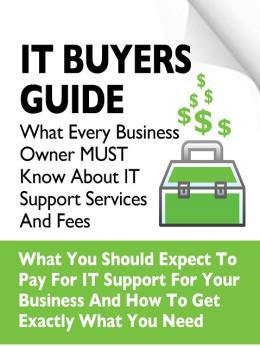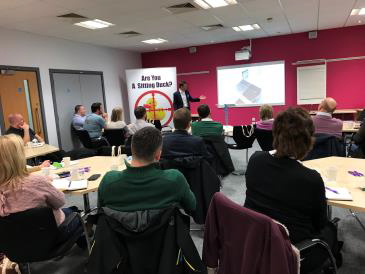Sneaky Ways Cybercriminals Access Your Network And What You Can Do To Prevent It TODAY

Hackers prefer the little guy. The high-profile data breaches you read about in the news - your Facebooks and Equifaxes and T-Mobiles - are only the tip of the iceberg when it comes to the digital crimes being perpetrated day after day. Especially against small businesses. Today, according to a report by the National Cyber Security Alliance, 70 percent of hackers specifically target small businesses. Attracted by the prospect of easy money, they search for those organisations who underspend on protection, who have employees untrained to spot security risks, and who subscribe to woefully out-of-date practices to protect their data. As a result, more than 50 percent of small businesses have been hacked, while 60 percent of companies breached are forced to close their doors within six months.
Most business owners have no idea the danger they’re putting their livelihood in by leaving cyber security up to chance. According to a survey conducted by Paychex, 68 percent of small-business owners aren’t concerned about their current cyber security standards, despite the fact that around 70 percent of them aren’t adequately protected. In the face of an imminent, global threat to the very existence of small businesses everywhere, a lot of business leaders offer up a collective shrug.
The tactics and software available to hackers become more sophisticated by the day, but with so many unwitting victims, most criminals don’t even need to work that hard to net a six-figure income. By sticking to two tried-and-tested tools of the trade - phishing, ransomware and the subtle art of guessing users’ passwords - they leech comfortably off the earnest efforts of small businesses all over the world.
The tactics and software available to hackers become more sophisticated by the day, but with so many unwitting victims, most criminals don’t even need to work that hard to net a six-figure income. By sticking to two tried-and-tested tools of the trade - phishing, ransomware and the subtle art of guessing users’ passwords - they leech comfortably off the earnest efforts of small businesses all over the world.
So, what’s to be done? Well, first things first: You need to educate yourself and your team. Protect your organisation against phishing by fostering a healthy scepticism of any email that enters your inbox. Make it a habit of hovering over hyperlinks to check their actual destination before you click. If an email is coming from someone you know, but the email address is different, verify it with the other party. Also, never send passwords or personal details to anyone over the internet if you can avoid it.
Speaking of passwords, you probably need to upgrade yours. The majority of people use the same password for everything from their Facebook account to their business email. The fact that this includes your employees should make you shudder. It may not seem that important - who’s going to take the time to guess FootBa11MuM66? Aside from the fact that simple software enables hackers to guess even complicated passwords in minutes, that’s not even usually necessary. Instead, they can just look at the data dumps from a recent more high-profile breach - think the Equifax fiasco - pull your old website from there and type it into whatever profile they want to access. If you keep all your passwords the same across sites, it won’t take them long to dig into your most precious assets. To avoid this, implement a strict set of password regulations for your business, preferably incorporating two-factor authentication and mandatory password changes every few weeks.
Of course, you can read up on hacking techniques and teach them to your team until you’re blue in the face, and a data breach can still occur. Cybercrime is constantly evolving and staying abreast of its breakneck pace takes a dedicated awareness of the latest protective tools and measures. That’s why your single best weapon to defend you against the hackers at your door is to find a managed service provider (MSP) with a background in defending against digital threats to partner with your organisation. These companies not only regularly monitor your network, they also keep it updated with the latest patches and measures to prevent the worst. If crisis somehow still strikes, they’ll be able to get your network back up in minutes rather than days, equipped with an expert knowledge of your systems and years of experience in the field. Vermont can of course help, on this area.
In today’s digital world, leaving your cyber security up to a subpar antivirus and some wishful thinking is more than irresponsible - it’s an existential threat to your company. But with a little savvy, planning, a bit of investment and a second opinion on the circumstances of your company’s security, you can rest easy knowing that no matter what comes, you’re protected.
Free Report Download: The Business Owner’s Guide To IT Support Services And Fees

Discover:
- The three most common ways IT companies charge for their services.
- A common invoicing model that puts ALL THE RISK on you.
- How to make sure you know exactly what you’re getting to avoid disappointment, frustration and unexpected added costs in the future.
Download Now: www.vermont.co.uk/itbuyersguide/
SHINY NEW GADGET OF THE MONTH: This Smartphone Is Also A Projector: Introducing The Movi

Of course, your big honking iPhone or massive Android is impressive, but does it have a screen the size of an entire wall?
The Movi is the first smartphone to integrate a built-in pico projector into its design, allowing users to project 720p images up to 200 inches in size wherever they are. At only £460.00, it could be seen as a bargain when compared to comparable projectors.
However, there are caveats: the Movi’s FHD phone screen can’t compare to its higher end OLED competitors, and its camera leaves something to be desired. But if you’re an avid video buff with a mind for convenience, the Movi may be just what you’re looking for.
For further details visit: https://moviphones.com/
Watch Your Doors
By Mark Sanborn, CSP, CPAE,
When was the last time you looked at the doors to your business? It isn’t just about who comes in; it’s also about how they enter.
Let me give you an example. A new restaurant opened near my office. It’s been very successful, and I eat there regularly. The only problem is the horrendous door you have to go through to get in. Opening it causes a grating sound, not unlike that horrendous sound of finger nails on a blackboard! Also the pull is also hard and inconsistent. At first I thought they’d fix it, but since it hasn’t been dealt with in months, it’s clear to me that the owners don’t give much thought to the first impression it creates.
Actual doors are important, but the metaphorical doors to your business are even more important. These “doors” are entry points, drawing people in or keeping them out. They can welcome, or they can warn.
What about the doors to your business?
Your website is your online door. Is it aesthetically pleasing? Easy to navigate? Up-to-date? Can a visitor quickly find contact information? Does it just advertise, or does it make it easy for visitors to actually take action?
Your phone is a door too. Whether answered by a person or a recorded message, it speaks volumes about your professionalism and punctuality.
The way you handle customer service, sales or support requests is yet another door. How easy is it for a customer to contact you with details on their requirement? Do your employees arrive when promised? Are they professional in appearance and friendly in demeanor? Then there’s your social media accounts. What image do your various platforms convey? Does your social media support or detract from your brand? Your office environment is another. Is it a place customers’ visit and enjoy or endure? If you serve coffee, how good is it?
Gordon Hinckley said, “Eternal vigilance is the price of eternal development.” Paying attention consistently will allow you to develop and achieve success. Ignoring the doors, literal and metaphorical, can be costly.
A good door makes it easy for customers to enter. A great door invites them in and sets the tone for what follows.
4 Reasons You Should Move Your Data To The Cloud TODAY

If you’re one of the sceptics holding out on incorporating cloud technology into your business, you’re in the minority. Today, a full 93% of businesses now use the cloud in their day to day operations, according to RightScale.
Here’s why:
- The cloud increases profits. The nimble, location-flexible nature of the cloud enables lean, remote operation from anywhere in the world, increasing the bottom line of SMBs.
- The cloud boosts efficiency. Without the need for data silos, cloud applications can drastically reduce bottlenecks and failures.
- The cloud saves money. Instead of paying to maintain unused hardware, the cloud allows you to pay low monthly fees, reducing wasted funds.
- The cloud is more secure. Backups are that much easier to implement and access, meaning that your business can be up and running after a data breach in minutes rather than days.
Smallbiztrends.com 27/11/2018
Top Tactics To Improve Company Culture
A healthy company culture does a lot more than just make work life bearable. It also draws in talent, increases productivity and has many other benefits. Contrary to what some CEOs may believe, culture begins with leadership.
To bolster a positive, winning environment within your business, make sure that above all, your team embodies the core values of your organisation. Hire and fire by the standards you’ve set and build an organisation that seeks to bring meaning to the business you do.
Also, be sure to maintain transparency at every turn. Nothing erodes trust and good vibes like secrets or the rumours they spawn. Unfortunately, many leaders struggle to understand that, when faced with a difficult situation, a thorough explanation will win the loyalty, respect and consideration of those you work with.
Finally, keep your vision locked on your organisation’s long-term goals. With a clear focus in mind for your employees, it’s a lot easier for everyone to stay on the same page and continue to push forward in earnest. Short-term wins are important, but it’s the visionary in you that will ensure the success of your business for the long haul.
Trivia – The First Mouse
The first computer mouse was publicly unveiled in 1968 by its inventor, Douglas C. Engelbart. He invented the computer mouse two decades before it would ship with the first Apple Macintosh!
Event Update
We are ready!

After months of planning there was of course heavy snow forecast in Hampshire for the 1st February. Oh dear! Fortunately, many hardy souls made it to Lakeside North Harbour, including the special guest speaker from Hampshire Constabulary who had a 2 mile walk in the snow to the train station to get there!
The Cyber Crime Prevention event was a huge success with some extremely humbling feedback received – Thank you everyone that attended.
People made it!

Sign Up To Receive Our Monthly Newsletters

"At all stages Vermont has remained in close communication, tackling any problems cheerfully and efficiently"
Running an investment specialist IFA needs complex integration of numerous databases and systems...Richard Palmer, Senior Planner Murdoch Asset Management

"We've set ourselves ambitious plans for business expansion through 2019 and are confident that Vermont will provide their support and guidance to help us achieve them"
This is a long-term relationship offering long-term benefits all round.Sarah Kay, Office Manager Turbo Service International
